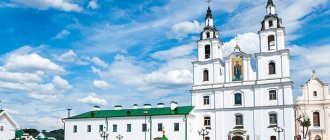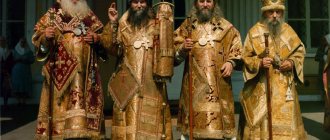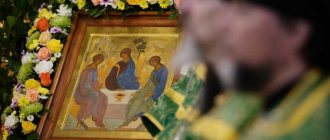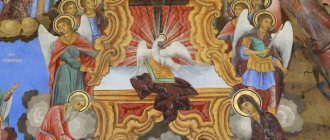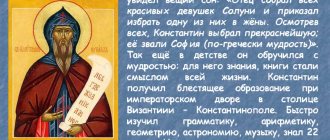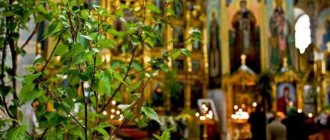Holy Spirit in Orthodoxy
Photo: Orel-eparhia.ru
The Church teaches that a person must honor the entire Holy Trinity at once, since all of these are hypostases of the one God. For simplicity of perception, priests suggest that the Father is the mind, his Son is the word, and the Holy Spirit is the soul. Together they form a single whole, as in ordinary life, where the mind, word and soul are inseparable from each other.
According to a number of interpreters of the Holy Scriptures, the Holy Spirit should also be understood as God’s power in direct action, for which there are no obstacles. To better understand this idea, it is worth considering the meaning of the phrase “the sun entered the house.” It does not mean that the luminary itself was in the room, but only speaks of the sun’s rays that penetrated the room, illuminating everything around. At the same time, the Sun itself remained in the sky. In the same way, God, thanks to the Holy Spirit, is able to be in many places at the same time.
Awareness of this is an important factor strengthening the faith of Orthodox Christians. They remember that the Lord is omnipresent, he is simultaneously in different places, not leaving his followers without help and support.
Recommendations
- Bultmann 2007, para. 153.
- ^ a b
Colley, Thomas Scott (2001).
"Holy Spirit". In Elwell, Walter A. (ed.). Evangelical Theological Dictionary
. Grand Rapids: Baker Academic. item 568. ISBN 978-1-4412-0030-3. - Levison, John R. (2009). Filled with spirit
. Grand Rapids: Wm. B. Eerdmans Publishing. paragraph 129. ISBN 978-0-8028-6372-0. - Bultmann 2007, para. 154.
- Harper, Douglas. "spirit (n.)". Online Dictionary of Etymology
. Retrieved August 29, 2016. - Harper, Douglas. "ghost (n.)". Online Dictionary of Etymology
. Retrieved August 29, 2016. - Espin, Orlando O. (2007). "Holy Spirit". In Espin, Orlando O.; Nikoloff, James B. (ed.). An Introductory Dictionary of Theology and Religious Studies
. Collegeville: Liturgical Press. item 576. ISBN 978-0-8146-5856-7. - Dunn, James D. G. (2006). "Towards the Spirit of Christ: The Emergence of the Distinctive Features of Christian Pneumatology". In Welker, Michael (ed.). The Work of the Spirit: Pneumatology and Pentecostalism
. Grand Rapids: Wm. B. Eerdmans Publishing. clause 3. ISBN 978-0-8028-0387-0. - Menzies, William W. and Robert P. "Spirit and Strength." Grand Rapids, MI: Zondervan, 2000.
- Bultmann 2007, para. 155.
- Bultmann 2007C. 156–157.
- Bultmann 2007C. 157.
- Konsmo 2010, paragraph 2.
- ^ a b
Konsmo 2010, paragraph 5. - Konsmo 2010, paragraph 6.
- Aurelius, Marcus (1964). Meditations
. London: Penguin Books. n.. ISBN 0-14044140-9. - This article incorporates text from a publication now in the public domain: Singer Isidore; et al., eds. (1901–1906). "Holy Spirit". Jewish Encyclopedia
. New York: Funk & Wagnalls. - Alan Unterman and Rivka Horowitz, Ruach HaKodesh, Encyclopedia Judaica (CD edition, Jerusalem: Judaica Multimedia/Keter, 1997).
- Gilles Emery (2011). The Trinity: An Introduction to the Catholic Doctrine of the Triune God
. Catholic University of America Press. ISBN 978-0-8132-1864-9. - Erickson, Millard J. (1992). Introduction to Christian Doctrine
. Baker's Book House. paragraph 103. - Hammond, T. K. (1968). Wright, David F. (ed.). Understanding Being Men: A Handbook of Christian Doctrine
(6th ed.). Intercollegiate press. pp. 54–56, 128–131. - Grudem, Wayne A. (1994). Systematic Theology: An Introduction to Biblical Doctrine.
Leicester, England: Inter-Varsity Press; Grand Rapids, MI: Zondervan. paragraph 226. - ^ a b
Luke 3:22, NIV - Acts 2:3, NIV
- Williams, Charles (1950). The Descent of the Dove: A Brief History of the Holy Spirit in the Church
. London: Faber. - Kasemann, Ernst (1960). The Beginnings of Christian Theology
[
W. J. Montagu, New Testament Questions Today
] (in German). 102: Philadelphia: Fortress. ISBN 978-1-316-61990-2 .CS1 maint: location (communication) - 1 Corinthians 13:4-11, NIV
- Wesley, John (2003). Holy Spirit and Power
. Kifover, Larry., Weekley, Claire G. ([Rev. and updated ed.] Ed.). Gainesville, FL: Bridge-Logos. paragraph 107. ISBN 088270947X. OCLC 53143450. - Acts 1:8
- Johnson, Bill. When Heaven Invades Earth
. Image of Destiny, 2005 - Plata, Gordon D. (1994). "God's Encouraging Presence: The Holy Spirit in the Epistles of Paul." Peabody, MA: Hendrickson.
- Quran search: روح القدس. searchtruth.com.
- "What does the Holy Spirit mean in the Qur'an?" Awareness of Islam
. Sheikh Ahmad Kutty. Retrieved November 14, 2022. - Griffith, Sidney H. The Holy Spirit
, Encyclopedia of the Quran. - Thomas Patrick Hughes, Dictionary of Islam
, p. 605. - 'Abdu'l-Bahá (1981) [1904–06]. "Holy Spirit". Some answers to questions
. Wilmette, IL, USA: Baháʼí Publishing Trust. pp. 108–109. ISBN 0-87743-190-6. - Taherzadeh, Adib (1976). The Revelation of Bahá'u'lláh, Volume 1: Baghdad 1853–63
. Oxford, UK: George Ronald. paragraph 10. ISBN 0-85398-270-8. - Abdo, Lil (1994). "Women's Conceptions of the Holy Spirit in Bahá'í and Christian Writings and Their Implications for Gender Roles." Review of Baha'i Studies
.
4
(1). - 'Abdu'l-Bahá (1981) [1904–06]. "Trinity". Some answers to questions
. Wilmette, IL, USA: Baháʼí Publishing Trust. pp. 113–115. ISBN 0-87743-190-6. - Camilia Gangasinghe Macpherson (1996). A critical reading of Raymond Panikkar's development of thought on the Trinity
. University Press of America. pp. 41–32. ISBN 978-0-7618-0184-9. - Veli-Matti Kärkkäinen (2010). The Holy Spirit and Salvation
. Westminster Press by John Knox. item 431. ISBN 978-0-664-23136-1. - Mary Boyce (1990). Textual Sources for the Study of Zoroastrianism
. University of Chicago Press. paragraph 12. ISBN 978-0-22606-930-2.
Help in getting rid of sins
Photo: Pravoslavie.ru
It is important to remember that the Holy Spirit plays a big role in the atonement of human sins. One of its goals is to convict the believer of a sinful act, and in advance, even before it is committed.
From early childhood, children raised in believing families know what sin is, what actions can lead to the violation of divine commandments. Moreover, according to the Holy Scriptures, all people are already born sinners. The Church teaches that one must devote one’s life to atonement for the original sin committed by Adam and Eve. This is where the Holy Spirit helps the believer.
It is also important to strictly observe the commandments throughout your life and lead a righteous lifestyle. Imbued with the idea of the Holy Spirit, every person understands that only by freeing himself from envy and anger, vanity and pride, does he have a chance to go to heaven after death.
Etymology
The word spirit
(from the Latin
Spiritus
meaning "breath") appears either alone or with other words in the Hebrew Bible (Old Testament) and New Testament. Combinations include expressions such as "Holy Spirit", "Spirit God", and in Christianity, "Spirit Christ".[1]
The word spirit
appears as רוּחַ (
ruach
) in parts of the Old Testament written in Hebrew.[2]
In its Aramaic parts, the term racḥ
.[3] The Greek translation of the Old Testament, the Septuagint, translates the word as πνεῦμα (
pneuma
- "breath").[2] This is the same word used in the New Testament, originally written in Greek.[4]
English term spirit
comes from the Latin origin,
Spiritus
, which is how the Vulgate translates Old and New Testament concepts.[5]
The alternative term "Holy Spirit" comes from the Old English translations of Spiritus
.[6]
Descent of the Holy Spirit
Photo: Pravlife.org
This is an important event for Orthodox believers, which is celebrated on 51 days after Easter. On Pentecost it is customary to pay homage to the Holy Spirit, who descended on the Apostles almost two months after the Resurrection of the Son of God.
On the occasion of this holiday, services are held in churches, and believers read prayers. It is believed that every year on this day divine grace descends on the Orthodox flock.
At the same time, the Descent of the Holy Spirit itself is not considered something unexpected. The Savior told his followers about him even before the crucifixion. Christ noted that the Holy Spirit would come to earth after his death to save people. Therefore, on the day of Pentecost in Jerusalem, about 100 believers gathered in the Zion Upper Room. Among them were the apostles and the Virgin Mary.
Despite the fact that everyone was waiting for the Descent of the Holy Spirit, it still happened unexpectedly for everyone present. Those gathered claimed that at first a noise arose above the upper room, as if from a strong wind. When this noise filled the entire room, flames appeared. The fire was very close, but it did not burn, but had amazing spiritual properties. Everyone who touched him experienced an unprecedented elation, a surge of joy and grace. They began to praise God. Some noticed that they had the ability to speak languages that they did not know before.
Peter's Sermon
Hearing the noise coming from the Upper Room of Zion, a large crowd of people gathered, because on that day everyone was celebrating Pentecost. With glorifications and prayers, the apostles went to the roof of the upper room. The people around were amazed at how simple, poorly educated people spoke foreign languages and preached the Gospel. Moreover, each of the crowd heard his own native speech.
In order to dispel the bewilderment of those gathered, the Apostle Peter came out to them. He addressed the people with his first sermon. He told how the ancient prediction about the descent of God's grace on them miraculously came true. Explained what the Holy Spirit is. It turned out that the meaning of his story reached everyone, because the descended Holy Spirit himself spoke through his lips. On this day, from 120 people, the church grew to three thousand Christians. This day began to be considered the beginning of the existence of the Church of Christ.
Connection with God
The most important thing is to understand that, thanks to the Holy Spirit, a person can discover his own depths, understand himself, understand what he is really worth. The Holy Spirit teaches believers to have a trusting and exclusively sincere relationship with the Lord.
It is the day of the Descent of the Holy Spirit, when all those gathered in the Zion Upper Room felt divine grace, that is considered to be the beginning of the existence of the Christian Church.
( 156 ratings, average: 4.43 out of 5)
Feast of the Holy Trinity
Every year the church celebrates the feast of the Holy Trinity, which coincides with Pentecost. They remember the grandiose event of the descent of the Holy Spirit. On this day the foundation of the Christian church was laid, parishioners strengthened in faith, renewed the gifts sent down by the Holy Spirit during the sacrament of Baptism. The grace of God gives everyone everything that is most sublime, pure, bright, and renews the inner spiritual world. If in the Old Testament teaching believers revered only God, now they knew about the existence of God himself, his only begotten Son and the third hypostasis - the Holy Spirit. It was on this day many centuries ago that believers learned what the Holy Spirit was.
You know everything
We see some statements that apply to ALL believers
- you know everything. Not “you will know.” You already know. WHO YOU ARE"? Of course they are born again believers.
– we have all received the anointing, which is true and not false, which teaches us. WHO are “WE” and WHO are “US”? Again, we are the born again. But please note that the conversation is NOT ABOUT THE FLESH. Because you cannot live according to the flesh, the flesh will not inherit the Kingdom - why then invest in it? Moreover, we say that we have died and live no more, but Christ lives in us.
Now we see that there is something or someone in us who teaches us.
